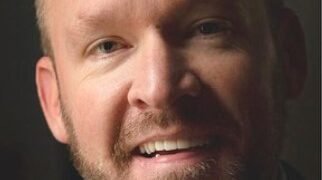Infinite Hope perseveres in its fight to help suicide survivors
(This article first appeared in the May print edition published April 30.)
On No. 12, 2020, Shelly Sutton’s son, Ross Hobgood, died by suicide.
“I was standing right there in front of him when he shot himself,” says Sutton. “It was like everything happened in slow motion.”
Sutton said she was haunted by her son’s death for more than two years after he died. She didn’t have any outlet, no one to talk to, no one who would understand the very specific trauma connected to survivors of those who die by suicide.
She said she was watching the past in a disassociated manner, as if she were an outsider looking in and not the survivor herself.
“I was still in shock,” she said. “I was not processing the grief at all.”
In time, she found Infinite Hope, a Henderson support group for survivors of suicide, and soon became a member of the group’s loss team. The loss team is a tandem who arrive to the location of a suicide as quickly as possible to start comforting those left behind.
Cindy Weaver, the founder and executive director of Infinite Hope, said the work of her organization is vital. She said the county in recent years has averaged seven deaths by suicide. But last year, that number doubled. And this year, she said that number is on pace to triple.
The reasons are plenty, including the loss of connection that has occurred in society, some of that replaced by text messages and social media, according to Weaver. Also many people are still living in isolation, a holdover caused by the COVID-19 pandemic, she said.
And financial issues continue to be a cause, said Sutton.
“I responded to one two months ago and his wife said it was due to financial issues,” Sutton said.
Infinite Hope receives a phone call from law enforcement when a death is determined to be a suicide. From there, the two-person loss team attempts to go to the location of the death as soon as possible.
The quicker they can arrive on scene, the better, within 30 minutes if possible. A survivor is more likely to “respond to you, get help and talk,” Sutton said. “That’s the beginning of processing that grief.”
But Infinite Hope is spread thin right now—several members are battling health problems, including Weaver—and that makes it difficult to always respond quickly.
Sutton said after 24 hours have passed, survivors often shut down and won’t respond to help. And that’s very dangerous because the grief is “kind of like a cancer—it will eat you alive,” Sutton said.
In addition to the loss team, Infinite Hope also partners with therapists so that when contacted by someone suicidal, a counseling session can be set up immediately, Weaver said. Additionally, Infinite Hope provides QPR Training (Question. Persuade. Refer), a suicide prevention training. And the organization can pay or help pay for biohazard cleanup after a suicide.
But what they are doing, they say, is not enough in Henderson or surrounding counties. The region needs more help. They believe the lack of mental health resources—a mental health desert—in the region keeps people from getting the help they need, whether for suicide prevention or for other mental health concerns.
What’s frustrating to Weaver, she said, is that Henderson in many ways is improving and growing, but many still turn a blind eye to suicide and mental health problems. She believes that’s due to the stigma attached to suicide and mental health issues.
The community needs more psychiatrists and therapists, and it needs mental health support groups, which, according to Weaver, Henderson does not have.
And Sutton, who was a second-grade teacher, said more mental health training must be put in place for teachers, who are often overwhelmed with their students’ problems.
“I’ve had little ones write in their journal that they want to die,” she said. She knows a remark like this could be a bad day or the effect from divorcing parents, but she also knows that it can lead to more serious problems if unchecked.
Currently, the city of Henderson is coordinating the second year of the Inner City Improvement Plan, and part of this year’s effort is to assess the needs of mental health and make a plan for the East End. But it’s not just one part of town that needs more resources, said Weaver. It’s everywhere.
Meanwhile, Infinite Hope is in the same boat as many other providers and resource sources that depend on donations—they need more: more money, more assistants and more awareness, said Weaver, who was drawn to this calling because she’s lost five people close to her by suicide in the past 20 years.
Weaver said her organization is vital to families because statistics prove that if a death by suicide occurs, it’s much more likely that later a family member will die by suicide.
“If families don’t get help, it continues on down the line,” she said.
Those who do get help, like Sutton, are sometimes able to turn their pain into a purpose, which helps in their own recovery.
“This work we’re doing now—it helps,” Sutton said. “You’re taking your pain and creating help.”
On Sutton’s first response, she was scared and nervous as she drove to the location. She prayed along the way.
“As soon as I stepped out of that car, I was ready,” she said. “God gave me what I needed to say and do to help this woman. I just knew what to do.”
Those survivors, during moments of the most traumatic shock a person can go through, instantly respond when they learn that Sutton is a survivor, too, she said.
“It just gives them hope when they see you,” Sutton said.
“To see somebody else who made it,” Weaver said.
“That they can do it too,” Sutton said.
***
If you or someone you love is in a crisis situation and need immediate help, please contact the Suicide and Crisis Lifeline at 988.
Contact Infinite Hope at 800-921-9431 or care@infinitehopekentucky.com
Infinite Hope’s main fundraiser, Bourbon For Hope, will be 6 p.m. July 12 at The Vault.

















